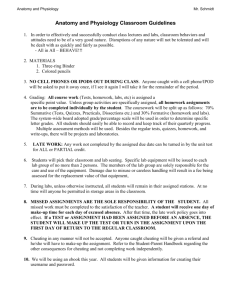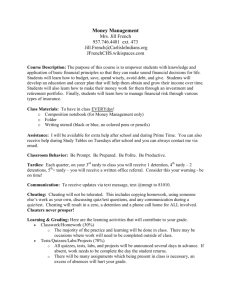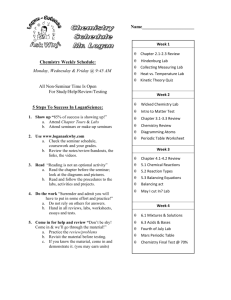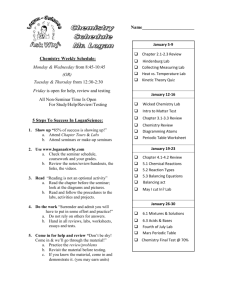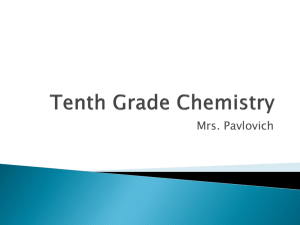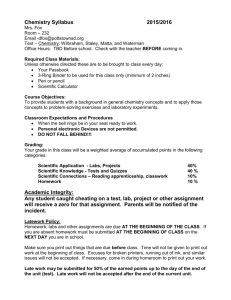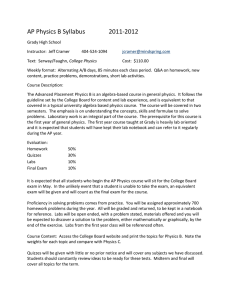Welcome to Back to School Night
advertisement
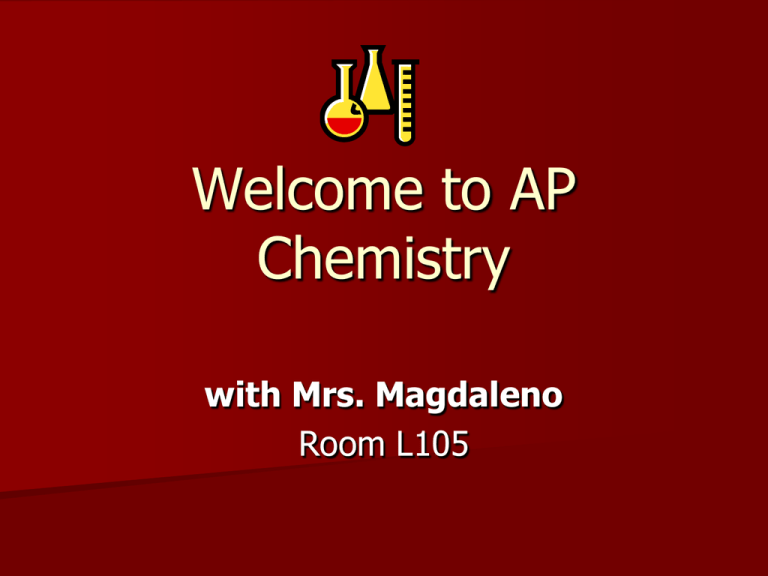
Welcome to AP Chemistry with Mrs. Magdaleno Room L105 Summary of the Course This class is geared toward you taking the AP Exam in May. This is a college level course, with required lab work. This means that we will have to work diligently in order for us to finish. We will move fast, and I expect students to have good background from first year chemistry. You will understand Chemistry as well as any college freshmen at the completion of this course. Approximate AP Score based on %Correct 5 – 66% 4 – 50% 3 – 33% Test Day = Monday, May 5th, 2014 at 8am Ways to help your student Remind them to study their ion flash cards Encourage them to keep a well organized notebook (as discussed in their syllabus) This will be very important when we get to the AP Test Time Encourage them to practice estimating answers without a calculator. They will not be able to use them on the multiple choice portion of the exam, so therefore they are not allowed to use them in this class on the multiple choice exams. Purchase an AP Chemistry Prep Book such as those by the Princeton Review, Barron’s, ARCO, Cliff’s, AP Chemistry for Dummies etc. Remind them NOT TO PROCASTINATE. It will be very hard to catch up. Attendance is very important! Please do not plan vacations during the school year! They must schedule time each night for chemistry, even if it is only 15 minutes to read their notes and flashcards! They should expect to spend 30 minutes to 1 hour each night on average. Students should keep all lab reports in a separate notebook. Colleges may ask to see evidence that they performed certain labs before they give them credit for the lab at their college. Assignments You Should Expect Every Unit: Below are the assignments that students can expect for each unit. Daily Homework Reaction Predictions Lab Reports Tests and Quizzes They will receive more detailed daily calendars for each unit. This calendar will be posted on my website as well. Daily Homework: Expect homework to be assigned on a daily basis. Homework should be attempted each night. You are responsible for asking questions on problems you do not understand and making corrections to your homework. These problems will be the student’s preparation for exam questions and possible homework quizzes. Homework for the entire unit will be collected on test day. All textbook problems should have the question written in ink with the answer below it in either ink or pencil. Reaction Predictions Understanding what will form in a chemical reaction is a key concept in AP Chemistry. We will introduce these in unit 2 and you can expect a reaction prediction practice worksheet every 2 weeks until the AP exam. These reactions will also be a part of every unit essay test.(except the first one) Laboratories: Each unit you will do one or more lab(s). These will help prepare you for the one or two lab questions on the AP essay exam that will target one of the labs we do this year. Most labs will require a formal write-up based on a given format. All labs and write-ups should be kept in a separate section in your notebook. Some labs will take more than one class period to complete and some will be guided inquiry labs which may also take longer. Students will be required to make up labs you miss. Homework Policies Lab Reports will receive: Full-credit when turned in on the due date. Labs will receive 10% less credit each day to maximum of 50% NO CREDIT if more than one week late. Homework Packets will receive: Full Credit when turned in on the due date. Half Credit when turned in late. In the case of an absence, it is the STUDENT’s responsibility to get the needed information. Leaving early for a sporting or other school event does NOT excuse you from turning in your work on time before you leave! You also must make up all laboratories that you miss!!! Test and Quizzes Each test you take will resemble the actual AP Exam that you will take in May. Most tests are two days with the first day consisting of multiple-choice and the second made up of essay questions. They will also work each week on a set of predicting reaction problems once we reach that point in the course. They can also expect random quizzes on naming compounds, writing formulas and ions Materials needed for this class 3 ring binder (minimum of 2 inches) for each semester. Dividers – to separate materials for each unit, for reaction worksheets and labs. Scientific Calculator – TI 83 Graphing calculator is fine. Textbook Grades Grades will be based on a total points system with the approximate percentage of points coming from the following categories: Unit Tests – 55% Labs & Quizzes– 25% Homework – 10% Final Exam – 10% A 86-100% B 75-85% C 63-74% D 50-62% F 0-49% Test Redemption & Extra Credit No Unit Test Grades will be dropped. Lowest Unit Test Grade will be redeemed (or replaced) with your grade on the final exam (if it is higher than your lowest exam score) Extra Credit will only increase your grade percentage by 1% maximum per semester. Attendance & Tardies Attendance is extremely important in this class! Please avoid taking any vacations that will cause you to miss school days. It will be very difficult to make-up your work and understand it! YOU MUST BE HERE AND BE ON TIME!!!! Tardiness results when a student is not in his/her seat when the class bell rings. Each student will receive one free tardy, then following process will be followed 1st Tardy – Verbal Warning. 2nd & 3rd Tardy - Teleparent Contact. 4th Tardy - Teleparent and Detention assigned 5th Tardy Attendance Contract and possible drop from class
